Feeling uncomfortable from gas or belly bloat? Eat some of these foods at your next meal to help reduce bloating naturally.
Our editors and experts handpick every product we feature. We may earn a commission from your purchases.
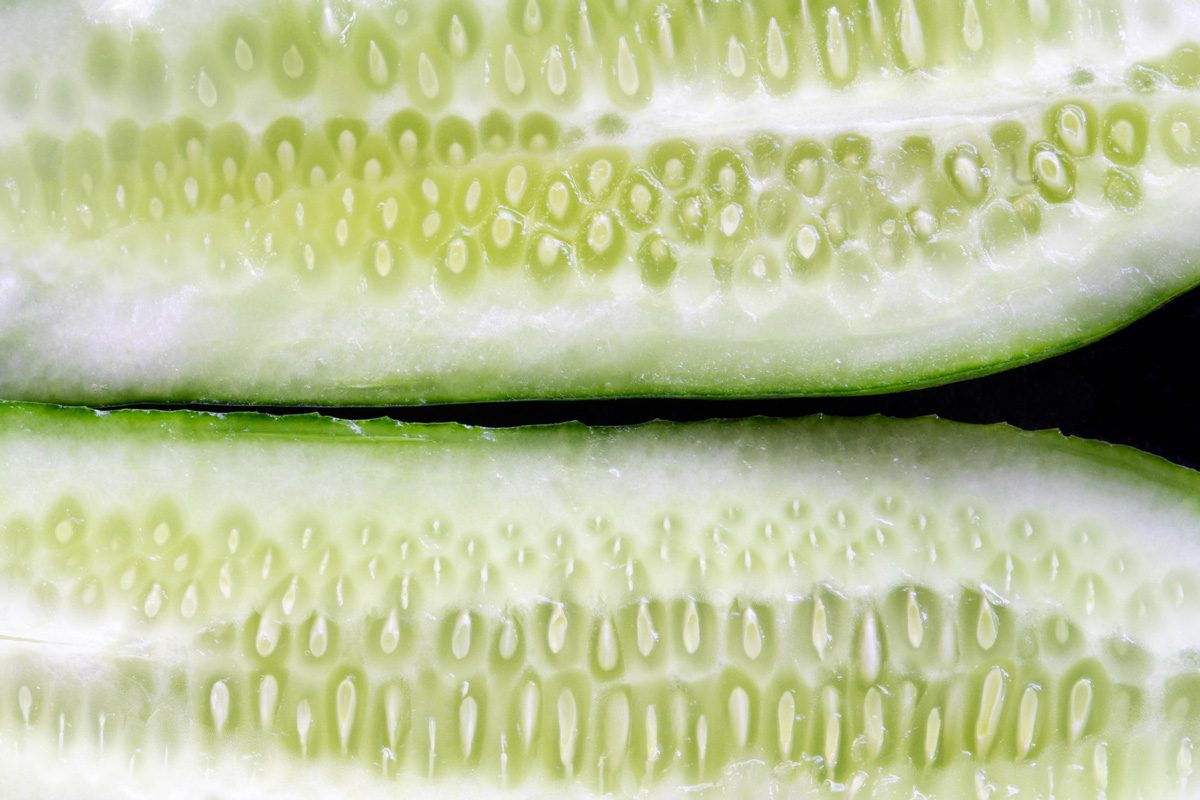

Feeling uncomfortable from gas or belly bloat? Eat some of these foods at your next meal to help reduce bloating naturally.
Our editors and experts handpick every product we feature. We may earn a commission from your purchases.
About the experts
|
Highlights
|
Stomach feel tight, full, uncomfortable? Certain foods can cause gas and discomfort—but certain foods also help to reduce bloating, too.
What, exactly, is that bloated feeling? “Bloating is the sensation that there is pressure built up in the gut,” explains Sandra (Yujia) Zhang, MS, RDN, LDN, a registered dietitian nutritionist and pediatric dietitian at the Frances Stern Nutrition Center at Tufts Medical Center. “Abdominal tenderness, distension, and pain can come with it.”
Bloating is mainly caused by an excess of intestinal gas, says Julia Zumpano, RD, LD, a registered dietitian with the Cleveland Clinic Center for Human Nutrition—and people often have to pass this gas for relief, Zhang says.
“Foods high in fiber, carbonated beverages, and sugar alcohols can contribute to [this] gas,” Zumpano explains. While avoiding known triggers is among the best ways to prevent bloating, below, our experts offer their go-to foods to reduce bloating, plus lifestyle tips to keep this gassy discomfort away.
Bloating occurs because there’s a buildup of air in the gastrointestinal (GI) tract. “If you have occasional bloating, it’s likely caused by what you ate,” Zumpano says. “Gasses in your intestines are mostly produced by your gut bacteria breaking down carbohydrates, which is a process called fermentation,” she explains.
If foods sit in the GI tract for too long, excess fermentation and gas buildup can occur. Zhang says that this can happen from eating high-fiber or high-fat foods that take longer to digest or if we’re intolerant to a food and not able to digest it.
Another reason too much fermentation can occur is because the carbs weren’t naturally absorbed earlier in the digestive process, Zumpano says. “The cause for this could be eating too fast or too much, a specific food intolerance, or a GI issue or disease.”
If you have chronic bloating, it might be due an issue in the GI tract. Zhang says this could include:
“Eating too fast, talking while eating, chewing gum, drinking through a straw, and drinking carbonated beverages can also cause air to enter the GI tract, causing bloating,” Zhang says.
There isn’t a go-to diet to completely prevent bloating, Zhang says. “People can have different levels of intolerance to foods.” For instance, beans are a great source of fiber, protein, vitamins, and minerals—but their high fiber content can trigger excess gut fermentation that makes some people bloat.
In general, she says that avoiding excess fiber in a single meal, avoiding high-fat meals, and eating slowly and mindfully can help prevent bloating. But certain foods may calm your gut and help flush out bloating that’s already in progress, according to the experts.

A well-known remedy for an upset tummy, ginger is a popular remedy for bloating. “It helps with digestion and provides relief from numerous GI distresses, including nausea and bloating,” says Deborah Orlick Levy, MS, RDN, a registered dietitian nutritionist and nutritional consultant.
Ginger can also help relax gut muscles—and as a tea, they’re soothing on your system thanks to the warm temperatures, Zhang says.
Levy’s go-to foods to reduce bloating include ginger candy, ginger tea, and adding fresh ginger to yogurt and stir-fries.

Flush out urine while simultaneously flushing out that bloated feeling. “Asparagus contains prebiotics, which, like probiotics, help support good digestive bacteria,” says Levy. “That combination, along with flushing out water in the body, helps to relieve bloat.”
In fact, a 2023 research article published in Food Research International says that the types of prebiotics in asparagus support bacterial strains known to support good digestive health. This fiber helps soften stools, too, promoting better regularity. Asparagus also contains compounds like potassium and asparagine, which act as mild diuretics that can reduce water retention and bloat.
Be cautious, though: If you’re a person who has difficulty digesting asparagus, eating this vegetable may actually cause bloating.

You’re already bloated and you’re supposed to drink more water? Yep. However, steer away from carbonated drinks; they actually induce bloating and GI problems.
“Plain water helps everything flush out of your system,” says Levy. Staying well-hydrated also keeps digestion running smoothly, preventing and easing up constipation—one of the main causes of bloating.
It’s also important to consume enough water alongside fiber-rich foods. Without enough water, fiber can actually cause stools to harden up, leaving you feeling constipated and, therefore, bloated.
If water is too bland for your taste buds, Levy suggests adding slices of cucumber, orange, or lemon to liven it up.
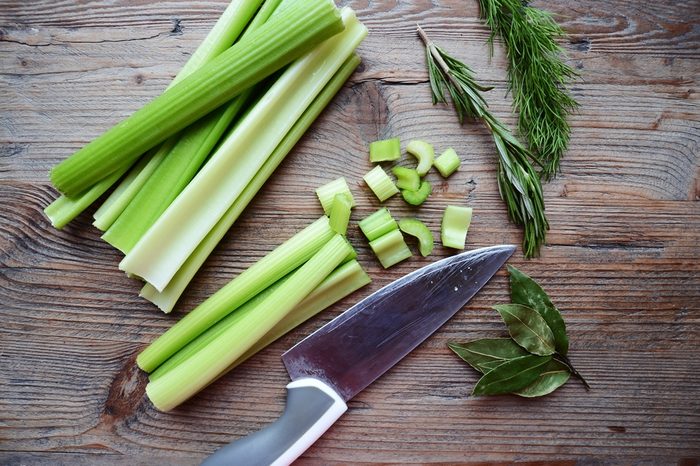
If you’re more in the mood for a snack than a glass of water, celery sticks might be the next best thing. First off, they’re around 95% water, giving your digestive system a hydrating boost. But celery also contains several bloat-busting nutrients. “Celery can be used as a digestive aid to control intestinal gas because its chemicals are known to decrease fluid retention,” says Jennifer Kartashevsky, RD, CDE, CDN, a registered dietitian and certified diabetes educator at Mount Sinai Doctors in New York.
According to 2025 research published in Pharmacological Research – Reports, celery contains:
Celery also contains pectins, a type of complex carbs that may stimulate gut motility to move things along.

Some of us just can’t tolerate dairy and may be lactose intolerant—and food intolerances are a major contributor to bloating and other digestive symptoms. But even more of us may have lactose malabsorption—up to 65% of adults worldwide—according to the Cleveland Clinic. This means that the body can’t fully digest lactose, the sugar found in dairy products.
Some people with lactose malabsorption might not experience any symptoms from consuming dairy. But for others, this sugar sitting too long in the GI tract can lead to bloating.
Plant-based versions of traditional dairy products can provide a non-bloating alternative, says Martica Heaner, MA, MEd, PhD, adjunct associate professor of nutrition at Hunter College in New York.
“The sugar or lactose in milk can cause belly bloat and pain,” says Dr. Heaner. “The dairy proteins can cause inflammation that may lead to mucus buildup and fluid retention.” So, plant-based options make for a good swap to prevent bloating in the future—but oat milk specifically may help reduce bloating in action, too.
This is because oat milk is a rich source of beta-glucans, a prebiotic that supports digestion and gut health. One 2022 study published in Food & Function found that people consuming oat beta-glucan experienced significantly reduced bloating.
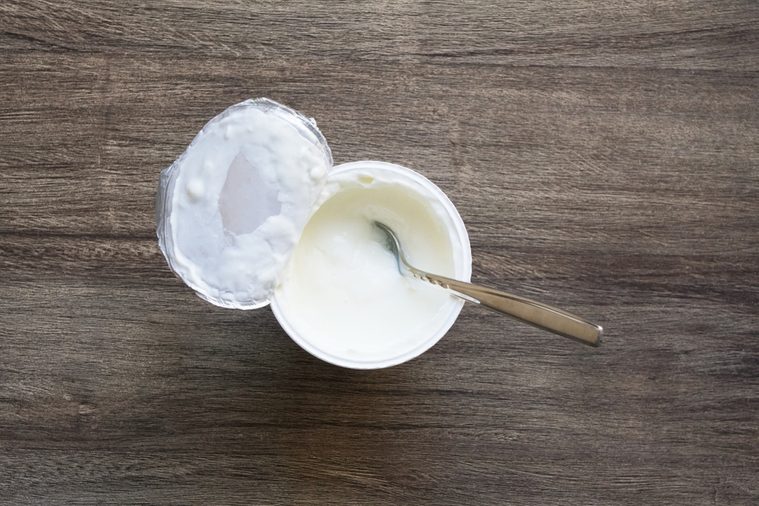
If dairy isn’t a problem for you, try kefir, a fermented milk beverage, and yogurt. Both contain probiotics, which are good for the belly, body, and bloating, according to Rene Ficek, RDN, CDCES, lead nutrition expert at Seattle Sutton’s Healthy Eating.
“Kefir and yogurt promote good bacteria in the gut, which helps the digestive tract work more efficiently,” says Ficek. “As a result, you will be prone to less gas and bloating.”
You can use kefir just like you would milk—drink it on its own, pour it over cereal, mix it into smoothies, add it to overnight oats, or use it as a base for a creamy salad dressing, dip, or sauce.

If you don’t consume dairy—or you’re wondering if it’s contributing to your bloating—there are other fermented foods that help tackle bloating, such as kimchi, kombucha, and apple cider vinegar, Zumpano says.
“[These probiotic foods] can help supplement or rebalance your gut bacteria,” she explains. “Some will help you digest your food better in the first place, and others may actually help absorb excess gasses.” Kombucha, for instance, is packed with probiotics that help break down the foods that might be sitting in your gut, per 2022 research published in Chinese Herbal Medicines.
Kimchi has particularly powerful digestive effects, too, according to research. “It contains probiotics that support healthy intestinal flora and alleviates gut microbiota symptoms like bloating and gas,” explains David Nico, PhD, of Drhealthnut.com and author of Diet Diagnosis.
A 2023 review of studies published in the Journal of Ethnic Foods found that this Korean side dish reduces GI discomfort, including bloating. It’s even been shown to significantly relieve IBS symptoms.
Not a fan of kimchi? Sauerkraut has the same benefits—or try one of these other foods that boost good bacteria in your gut.

Crunchy on the outside and packed with 96% water on the inside, this salad topper is one of the top foods that reduce bloating.
“They are also full of fiber to help the digestive tract run smoother,” says Ficek. Cucumbers are rich in potassium, too, which can help balance out excess sodium that feeds into belly bloat, according to Northwestern Medicine. Just make sure to eat the cucumber skin—that contains most of its fiber and nutrients.
Don’t just save them for salads; add slices to your sandwich or wrap for a nice crunch. Or, pair cucumber sticks with a yogurt-based dip for a two-for-one bloat-busting combo.
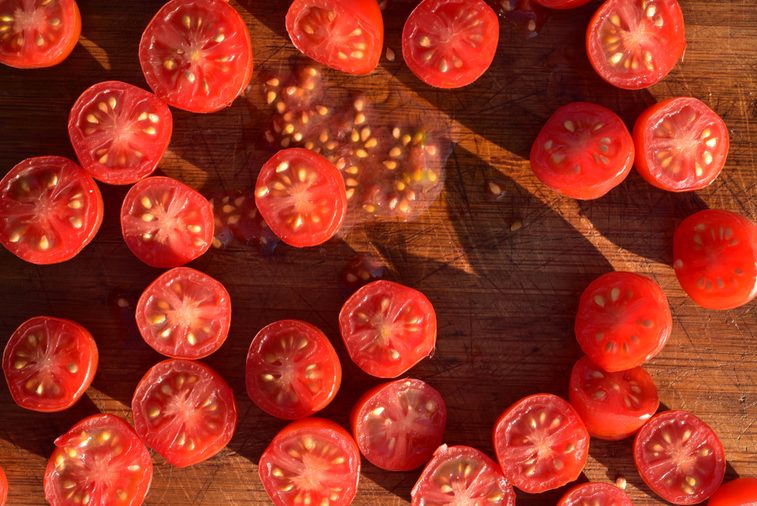
You say tomato, I say tomahto. However, you pronounce it, tomatoes are great for reducing bloating.
Similar to how cucumbers can curb bloat, “Tomatoes are rich in potassium, which helps balance out sodium levels in the body, resulting in less water weight and bloat,” says Ficek.
A 2022 review of research published in Biology shows that tomatoes can help with bloating in other ways, too:
The research notes that cooked tomatoes have a higher prebiotic content than raw. While cooking doesn’t affect its potassium content in the same way, cooking tomatoes can increase the concentration of potassium in the final product, like a marinara sauce.
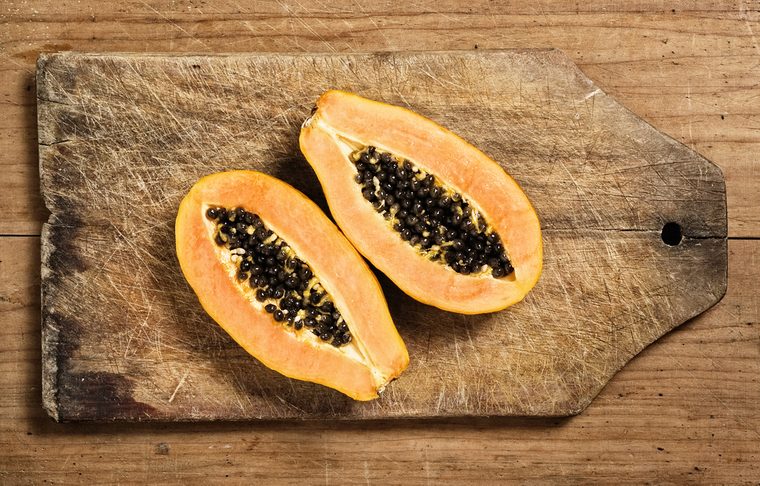
Pretty to look at and tasty to eat, yet some people are turned off by the odor of a ripe papaya. Don’t let the smell turn you away from its benefits for bloating.
“In a small study, a supplement containing papaya helped reduce gastrointestinal upset, including bloating,” says Adrienne Youdim, MD, director of the Center for Weight Loss and Nutrition at the Lasky Clinic in Beverly Hills, California, referring to a study published in Neuroendocrinology Letters.
Specifically, papaya contains an enzyme called papain, which helps stimulate parts of the stomach while relaxing others. This effect can alleviate bloating and digestive discomfort, according to 2021 research published in Neurogastroenterology & Motility.
You can eat papaya raw on its own or in a salad—but if the scent turns you off, try mixing it into smoothies with strong-tasting fruits, like banana, berries, or citrus fruits. You can also try green (unripe) papaya instead, which has a milder taste.

Dandelion tea can help relieve bloating related to water retention, Zumpano says. This is because it has a diuretic effect, helping to eliminate excess sodium and fluids while kicking the digestive system into gear.
According to 2024 research published in the International Journal of Frontiers in Biology and Pharmacy Research, dandelion tea may be particularly helpful in reducing pre-menstrual syndrome (PMS)-related bloating.
You can buy pre-packaged dandelion tea, or you can make it yourself by steeping the leaves, flowers, or roots of a dandelion in hot water. According to the Cleveland Clinic, dandelion roots have a flavor similar to coffee, making for a great caffeine-free substitute.
But speak to your doctor before adding dandelion tea to your routine, as it may interact with certain medications. Pregnant women and people with an allergy to ragweed should also avoid dandelions.
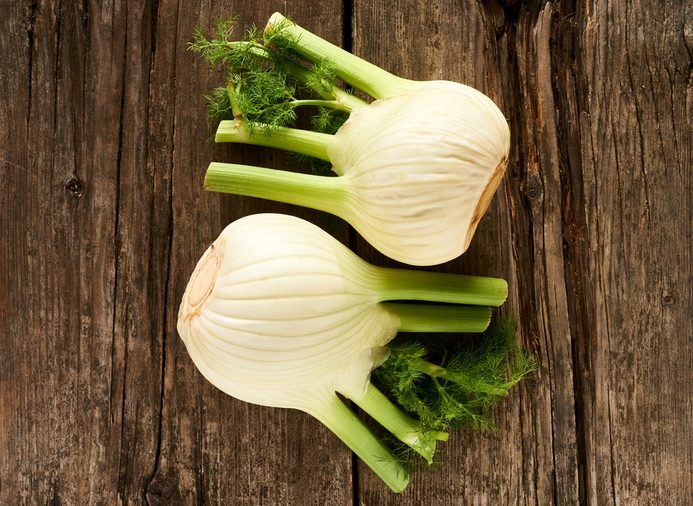
This Mediterranean vegetable is known for its licorice-like taste and is one of the best foods that reduce bloating you should try. Eat the seeds or brew a cup of fennel tea the next time your tummy is bloated.
“Fennel is shown in studies to be an excellent source of reducing the effects of gas and bloating along with many other benefits,” says Dr. Nico.
According to 2024 research published in the Journal of Education and Health Promotion, the main ingredient in fennel is called trans-anethole, a chemical that relaxes our intestinal muscles. This works to reduce bloating by encouraging bowel movements and passing gas. Fennel also has anti-inflammatory properties, which can ease bloating and has been shown to help improve symptoms in people with IBS.

How about a cup of tea with dinner when you’re bloated?
“Peppermint teas are excellent to start a meal and to improve digestion,” says Dr. Nico. The active compounds in peppermint can stimulate the digestive process, improving your gut’s absorption and overall function as you start eating, according to 2024 research published in Medicinal Plant Research.
If you’re in need of an instant fix, peppermint oil may be even more powerful. “Peppermint oil capsules are a natural antispasmodic,” Zumpano says. “That means they help your intestinal muscles relax. This can help you pass trapped poop and gas, especially if your problems derive from a motility issue.”
Peppermint is a therapeutic herb that’s long been used for medicinal uses, including digestive conditions and bloating. However, in some people, peppermint can aggravate heartburn.

Chia seeds are high in fiber, which helps you poop more regularly, Zumpano says. “Inadequate fiber and constipation can lead to bloating.” While she says to aim for 25 to 35 grams of fiber per day, it’s important to increase your fiber intake slowly and with plenty of water.
“Fiber can initially cause more bloating,” she explains. “But a high fiber diet can clean out fermented fecal matter [that’s causing bloating].” Chia seeds also act as a prebiotic, feeding your good gut bacteria, and they’re a good source of omega-3s, which help decrease inflammation.
“I often suggest adding these to a smoothie or protein shake,” Zumpano says. Though she adds: “Chia seed pudding or energy balls are two of my favorites.”

First and foremost: “Know your triggers,” Zumpano says. “If bloating is a chronic issue, keep a food diary to see if you can pinpoint certain food or drink triggers.”
Other strategies she recommends to keep bloating at bay include:
Along with the foods that help reduce bloating, there are some over-the-counter remedies that can help combat bloat. “Magnesium supplements help to neutralize stomach acid and relax the intestinal muscles,” Zumpano says. “Magnesium has a natural laxative effect, which can be helpful to relieve constipation or to keep bowel movements regular.”
Antacids have also been shown to relieve inflammation in the digestive tract, which can help you pass gas more easily, she explains. “Antacids often include the active ingredient simethicone, which works to pass gas by grouping smaller gas bubbles together,” she says. “Simethicone is also available separately.”
But if you’re dealing with constant bloating, seek help, Zumpano says. “A registered dietitian or your healthcare provider may want to do some more in-depth testing or screening if the bloating is persistent and not resolving with dietary and lifestyle measures.”
For daily wellness updates, subscribe to The Healthy by Reader’s Digest newsletter and follow The Healthy on Facebook and Instagram. Keep reading: